Letter Of Endorsement For Award
Subject: Letter of Endorsement for [Name of Award]
Dear [Recipient's Name],
I am writing this letter to wholeheartedly endorse and support the nomination of [Nominee's Name] for the esteemed [Name of Award]. As [Nominee's Title/Position] at [Nominee's Organization], [he/she] has consistently demonstrated outstanding dedication, exceptional skills, and remarkable contributions in [relevant field or area].
I have had the privilege of closely working with [Nominee's Name] for [duration of collaboration], and throughout our professional relationship, [he/she] has continually impressed me with [his/her] unwavering commitment to excellence and passion for [specific achievements or initiatives]. [Nominee's Name] has consistently surpassed expectations, going above and beyond to make a significant impact and achieve remarkable results.
What truly sets [Nominee's Name] apart is [his/her] unique blend of [mention exceptional qualities, such as leadership, creativity, innovation, or problem-solving skills]. [He/She] has consistently demonstrated exceptional leadership skills by [provide specific examples of leadership initiatives or projects] and has effectively motivated and inspired [his/her] colleagues to achieve excellence in their respective roles.
Furthermore, [Nominee's Name] possesses an impressive track record of [specific accomplishments or achievements], which have garnered recognition and admiration within our industry. [He/She] consistently exhibits a strong work ethic, a keen eye for detail, and an ability to deliver exceptional results under challenging circumstances.
In addition to [Nominee's Name]'s professional achievements, [he/she] also actively contributes to the community through [mention any relevant volunteer work, community engagement, or charitable endeavors]. [His/Her] dedication to making a positive impact extends beyond [his/her] professional responsibilities, showcasing [his/her] genuine commitment to the betterment of society.
Based on [Nominee's Name]'s exceptional qualities, remarkable accomplishments, and unwavering commitment to excellence, I am confident that [he/she] is a deserving candidate for the prestigious [Name of Award]. I wholeheartedly endorse [his/her] nomination and believe that [his/her] contributions have significantly enriched [relevant field or area].
If you require any further information or would like to discuss [Nominee's Name]'s qualifications in more detail, please do not hesitate to contact me at [your contact information]. Thank you for considering this endorsement, and I strongly urge you to give [Nominee's Name] the utmost consideration for the [Name of Award].
Sincerely,
[Your Name]
[Your Title/Position]
[Your Organization]
Academic Excellence Award - Department Head Endorsement
Subject: Endorsement for [Candidate Name] for [Award Name]
Dear [Award Committee Chair/Selection Committee],
I am writing to wholeheartedly endorse [Candidate Name] for the [Award Name]. As [Your Position] at [Institution Name], I have had the privilege of working closely with [him/her/them] for [duration] and can attest to [his/her/their] exceptional qualifications for this recognition.
[Candidate Name] has consistently demonstrated outstanding performance in [specific area]. [His/Her/Their] contributions to [specific achievements] have significantly impacted our [department/organization/field]. Notably, [provide 2-3 specific examples of accomplishments with measurable outcomes].
What distinguishes [Candidate Name] from peers is [his/her/their] remarkable ability to [unique quality]. [He/She/They] has shown exceptional leadership in [specific instance], resulting in [specific positive outcome]. Additionally, [his/her/their] commitment to [relevant value] exemplifies the core criteria of this award.
I have observed [Candidate Name]'s dedication to excellence through [specific observation]. [His/Her/Their] innovative approach to [specific challenge] not only solved immediate problems but established new standards for our entire [department/organization].
Without reservation, I believe [Candidate Name] embodies the qualities this award seeks to honor. [He/She/They] would be a most deserving recipient, and I offer my strongest possible endorsement for [his/her/their] candidacy.
Please feel free to contact me at [phone] or [email] should you require additional information.
Sincerely,
[Your Name]
[Your Title]
[Department/Organization]
[Contact Information]
Employee of the Year - Supervisor's Endorsement
Subject: Strong Endorsement for [Employee Name] - Employee of the Year Award
Dear Selection Committee,
It is with great enthusiasm that I endorse [Employee Name] for the Employee of the Year Award. As [his/her/their] direct supervisor for the past [duration], I have witnessed firsthand the exceptional dedication and performance that makes [him/her/them] an ideal candidate for this honor.
[Employee Name] has exceeded performance expectations in every measurable category. This year alone, [he/she/they] has achieved [specific metric, e.g., "120% of sales targets," "reduced processing time by 35%," "maintained 99% customer satisfaction rating"]. These numbers, impressive as they are, only partially capture [his/her/their] value to our organization.
Beyond metrics, [Employee Name] demonstrates qualities that inspire the entire team. [He/She/They] has voluntarily [specific example of going above and beyond], mentored [number] new employees, and consistently volunteers for challenging projects that others avoid. When we faced [specific challenge], [Employee Name] took the initiative to [specific action], which resulted in [positive outcome].
[His/Her/Their] positive attitude is infectious. Even during our busiest periods, [Employee Name] maintains professionalism and encourages colleagues. [He/She/They] embodies our company values through [specific examples].
I cannot recommend [Employee Name] highly enough for this recognition. [He/She/They] represents the absolute best of what our organization stands for and would be a most worthy recipient of the Employee of the Year Award.
Please contact me at [contact information] if you need any additional details.
Best regards,
[Your Name]
[Your Position]
[Department]
Community Service Award - Informal Endorsement
Subject: Endorsing [Name] for Community Service Award
Hi [Committee Member Name/Team],
I'm reaching out to give my full support for [Name]'s nomination for the Community Service Award. I've worked alongside [him/her/them] on several community projects over the past [duration], and honestly, I can't think of anyone more deserving.
[Name] has put in countless volunteer hours with [organization/cause]. Whether it's organizing food drives, tutoring kids after school, or rallying volunteers for neighborhood cleanups, [he/she/they] shows up every single time. Last year alone, [he/she/they] logged over [number] volunteer hours and directly impacted [number] families in our community.
What really stands out about [Name] is that [he/she/they] doesn't do this for recognition. When [specific challenging situation occurred], [Name] was there without being asked, coordinating [specific action] and making sure everyone's needs were met. That's just who [he/she/they] is.
The kids at [location/program] absolutely love [him/her/them]. Parents constantly tell me how much [Name]'s mentoring has meant to their families. [He/She/They] has this gift for making everyone feel valued and heard.
[Name] makes our community genuinely better, and this award would recognize someone who truly lives the spirit of service every day.
Happy to chat more if you need anything else.
Thanks,
[Your Name]
[Your Role/Connection]
Lifetime Achievement Award - Formal Endorsement
Subject: Formal Endorsement for [Nominee Name] - Lifetime Achievement Award
Distinguished Members of the Selection Committee,
I am honored to provide this formal endorsement for [Nominee Name]'s nomination for the [Award Name] Lifetime Achievement Award. As [Your Title] and someone who has observed [his/her/their] remarkable career spanning [duration], I can state unequivocally that [Nominee Name] exemplifies the highest standards of excellence this award represents.
Over [his/her/their] distinguished [number]-year career, [Nominee Name] has made transformative contributions to [field/industry/community]. [His/Her/Their] pioneering work in [specific area] fundamentally changed how we approach [specific aspect]. The [specific achievement/innovation] that [he/she/they] developed in [year] continues to serve as the foundation for current practices and has influenced countless professionals in our field.
[Nominee Name]'s influence extends far beyond [his/her/their] direct accomplishments. [He/She/They] has mentored [number] professionals who now hold leadership positions across [field/industry]. [His/Her/Their] publications, including [specific notable works], are considered seminal texts that have shaped [field] discourse for decades. The [program/initiative/organization] that [he/she/they] founded in [year] has served [number] individuals and remains a vital resource today.
Throughout [his/her/their] career, [Nominee Name] has received [list major recognitions], yet [he/she/they] has remained humble and committed to advancing our collective knowledge rather than personal acclaim. [His/Her/Their] integrity, generosity, and unwavering dedication to excellence have set standards that inspire us all.
The Lifetime Achievement Award exists to honor individuals whose cumulative work has created lasting impact. [Nominee Name]'s legacy meets and exceeds every criterion for this distinction. I provide this endorsement with the utmost confidence and respect.
Respectfully submitted,
[Your Full Name]
[Your Title and Credentials]
[Institution/Organization]
[Complete Contact Information]
Innovation Award - Peer Endorsement
Subject: Peer Endorsement for [Colleague Name] - Innovation Award
Dear Awards Committee,
I am pleased to endorse my colleague [Colleague Name] for the Innovation Award. Having collaborated with [him/her/them] on multiple projects over [duration], I have directly experienced the creative problem-solving and forward-thinking approach that distinguishes [his/her/their] work.
[Colleague Name]'s recent innovation in [specific area] represents a genuine breakthrough. When our team encountered [specific problem], traditional approaches had failed repeatedly. [Colleague Name] proposed [innovative solution], which initially seemed unconventional but proved remarkably effective. The solution has since been adopted across [scope] and has generated [measurable results, e.g., "cost savings of $X," "efficiency improvements of X%," "new revenue streams"].
What impresses me most is [his/her/their] ability to think beyond immediate constraints. During the development of [project name], [Colleague Name] identified an opportunity that none of us had considered: [specific insight]. This led to [unexpected positive outcome] and opened entirely new possibilities for our work.
[Colleague Name] also generously shares knowledge. [He/She/They] has conducted [number] training sessions, helping our entire team adopt more innovative thinking practices. [His/Her/Their] collaborative approach ensures that innovations don't remain isolated but become integrated into our collective capabilities.
[Colleague Name]'s contributions exemplify the innovative spirit this award celebrates. I enthusiastically support [his/her/their] nomination and believe [he/she/they] would be an excellent recipient.
Sincerely,
[Your Name]
[Your Position]
[Contact Information]
Teaching Excellence Award - Student Endorsement
Subject: Student Endorsement for Professor [Name] - Teaching Excellence Award
Dear Selection Committee,
I am writing to enthusiastically endorse Professor [Name] for the Teaching Excellence Award. As a student in [his/her/their] [course name] class during [semester/year], I experienced teaching that genuinely transformed my understanding of [subject] and inspired my academic path.
Professor [Name] has an extraordinary ability to make complex concepts accessible. [He/She/They] uses [specific teaching methods] that help students truly grasp difficult material rather than just memorize it. When I was struggling with [specific concept], Professor [Name] took extra time to [specific action], using [specific approach] that finally made everything click.
What sets Professor [Name] apart is [his/her/their] genuine investment in student success. [He/She/They] holds regular office hours and actually remembers details about each student's goals and challenges. [He/She/They] provided feedback on my [assignment/project] that went far beyond grades, offering insights that improved not just that work but my entire approach to [subject/field].
Professor [Name] creates an inclusive classroom where every student feels comfortable participating. [He/She/They] actively ensures diverse perspectives are heard and valued. When [specific situation occurred], [he/she/they] handled it with sensitivity and turned it into a meaningful learning opportunity for everyone.
Many students, including myself, credit Professor [Name] with influencing our career choices. [His/Her/Their] passion for [subject] and commitment to student growth exemplify everything the Teaching Excellence Award represents.
Thank you for considering this endorsement.
Respectfully,
[Your Name]
[Student Status/Program]
[Contact Information]
Leadership Award - Quick Endorsement Message
Subject: Leadership Award Endorsement - [Candidate Name]
Dear Committee,
I'm writing to endorse [Candidate Name] for the Leadership Award. As someone who has worked under [his/her/their] leadership for [duration], I've seen exceptional leadership qualities that deserve recognition.
[Candidate Name] led our team through [specific challenge] with strategic vision and genuine care for team members. [He/She/They] increased our [specific metric] by [percentage] while improving team morale and retention. That combination is rare.
[His/Her/Their] leadership style empowers rather than micromanages. [He/She/They] trusts team members with responsibility, provides necessary resources, and gives credit where it's due. Under [his/her/their] guidance, [number] team members have been promoted.
[Candidate Name] demonstrates integrity in every decision, even when difficult. [He/She/They] is the leader others aspire to become.
Strong endorsement for this recognition.
Best,
[Your Name]
[Your Position]
What is a Letter of Endorsement for an Award and Why is it Important?
A letter of endorsement for an award is a formal or semi-formal document written by someone in a position to evaluate a nominee's qualifications, advocating for that individual to receive a specific recognition or honor. This letter serves as third-party validation of the nominee's achievements, character, and suitability for the award.
The purpose behind these letters includes:
- Providing credible testimony: Awards committees receive many nominations, and endorsement letters offer trusted perspectives that help differentiate candidates
- Adding context: Letters explain the significance of achievements that may not be apparent from applications alone
- Demonstrating support: Multiple endorsements show broad recognition of the nominee's contributions
- Offering specific examples: Endorsers can provide concrete instances of excellence that bring qualifications to life
- Establishing credibility: Letters from respected figures in relevant fields carry substantial weight in selection decisions
- Fulfilling requirements: Many award applications specifically require endorsement letters as mandatory components
Who Should Write an Endorsement Letter for an Award?
The most effective endorsement letters come from individuals who have:
- Direct knowledge of the nominee's work, achievements, or character
- Relevant credentials or standing in the field related to the award
- Authority or expertise that lends weight to their opinion
- Sufficient interaction with the nominee to provide specific, detailed observations
Appropriate endorsers include:
- Supervisors, managers, or department heads for workplace awards
- Academic advisors, professors, or deans for scholarly recognitions
- Colleagues or peers who have collaborated with the nominee
- Community leaders familiar with volunteer contributions
- Clients or customers who have benefited from the nominee's services
- Professional association leaders or industry experts
- Previous award recipients in the same category
- Board members or executives familiar with the nominee's impact
The endorser should avoid conflicts of interest while having enough familiarity to write convincingly. Generic endorsements from distant acquaintances typically carry less weight than detailed letters from those with regular, substantive interactions with the nominee.
When Should You Send an Endorsement Letter for an Award?
Endorsement letters should be submitted in these situations:
- Required endorsements: When the award application explicitly requests supporting letters
- Nomination deadlines: Submit letters well before the stated deadline, ideally 1-2 weeks early
- Upon request: When the nominee asks you to provide an endorsement for their application
- Spontaneous endorsements: When you believe someone deserves recognition and proactively write to suggest their nomination
- Multiple award rounds: For awards with preliminary and final rounds, additional endorsements may be requested at later stages
- Annual award cycles: Regular timing when specific awards open for nominations each year
- Achievement milestones: Following significant accomplishments that warrant recognition
- Retirement or career transitions: When honoring someone's cumulative contributions
- Community impact becomes evident: After observing sustained positive influence
- Organizational anniversaries: When companies or institutions seek to recognize long-serving members
Always confirm submission deadlines and whether the endorsement should be sent directly to the committee or provided to the nominee for inclusion in their application package.
Elements and Structure of an Award Endorsement Letter
Every effective endorsement letter should include:
- Subject line (for emails): Clear reference to the award and nominee
- Formal greeting: Address the selection committee or specific chair
- Opening statement: Explicitly state your endorsement and the specific award
- Your credentials: Briefly establish your relationship to nominee and qualification to endorse
- Specific achievements: Provide 2-4 concrete examples with measurable outcomes when possible
- Unique qualities: Describe what distinguishes this nominee from others
- Personal observations: Share direct experiences that demonstrate the nominee's excellence
- Impact statement: Explain the broader significance of the nominee's contributions
- Comparative context: If appropriate, note how the nominee compares to others in similar positions
- Unequivocal support: Clearly state your strong recommendation
- Closing offer: Provide contact information for follow-up questions
- Professional signature: Include your full title and credentials
The structure should flow logically from introduction through supporting evidence to conclusion, maintaining focus on why this specific nominee deserves this specific award.
How to Write an Effective Award Endorsement Letter
Follow this process for maximum impact:
- Understand the award criteria: Review what qualities and achievements the award recognizes
- Gather specific information: Collect dates, metrics, project names, and concrete accomplishments
- Identify strongest evidence: Select examples that directly align with award criteria
- Choose appropriate tone: Match formality level to the award's prestige and context
- Lead with impact: Open strongly rather than building slowly to main points
- Use active, confident language: Avoid hedging words like "seems" or "appears"
- Provide context: Help readers understand the significance of achievements
- Balance breadth and depth: Cover multiple strengths while providing detail on key points
- Make it personal: Share specific interactions or observations that only you could provide
- Quantify when possible: Include numbers, percentages, and measurable outcomes
- Connect to bigger picture: Show how the nominee's work advances the field or community
- Proofread thoroughly: Errors undermine credibility
- Respect length guidelines: Most endorsements work best between 300-600 words unless specified otherwise
- Meet submission requirements: Follow stated format, delivery method, and deadline precisely
Formatting Guidelines for Award Endorsement Letters
Consider these formatting elements:
- Length: Typically one to two pages (300-600 words); longer for lifetime achievement awards
- Tone: Formal and professional for prestigious awards; slightly more casual for workplace or community recognitions
- Format: Business letter format for printed submissions; professional email format for digital
- Font and spacing: Standard business formatting (e.g., 12-point Times New Roman or Arial, single-spaced with space between paragraphs)
- Letterhead: Use official letterhead if endorsing in an institutional capacity
- Date: Include the date of writing
- Signature: Physical signature for printed letters; typed name acceptable for email
- Subject line clarity: For emails, make the subject immediately identifiable
- Paragraph structure: 4-6 paragraphs typically work well
- Attachment format: PDF preferred for maintaining formatting
- File naming: Use clear, professional naming (e.g., "Smith_Endorsement_Jones_Innovation_Award.pdf")
Maintain consistent formatting throughout and ensure the letter appears polished and professional, as its presentation reflects on both you and the nominee.
Common Mistakes to Avoid When Writing Award Endorsements
Avoid these frequent pitfalls:
- Being too generic: Vague praise without specific examples carries little weight
- Exaggerating or inflating achievements: Overstated claims damage credibility
- Focusing on irrelevant qualities: Stick to criteria that matter for the specific award
- Writing from templates without customization: Cookie-cutter letters are obvious and ineffective
- Including only job description duties: Describe achievements beyond basic responsibilities
- Making it about yourself: Keep focus on the nominee, not your own accomplishments
- Using clichés: Phrases like "team player" or "thinks outside the box" lack impact
- Failing to provide context: Readers may not understand the significance without background
- Missing deadlines: Late endorsements may not be considered
- Including unsolicited negative information: If you can't write positively, decline to endorse
- Copying language from the nominee's application: Use your own words and perspectives
- Being too brief: Minimal endorsements suggest limited enthusiasm
- Ignoring stated requirements: Follow all specified guidelines precisely
- Forgetting contact information: Committee may need to reach you for clarification
- Using inappropriate tone: Match seriousness to the award's prestige
Tips and Best Practices for Award Endorsement Letters
Maximize your endorsement's effectiveness with these strategies:
- Start immediately when asked: Gives you time to craft a strong letter without rushing
- Request nominee's materials: Review their application or CV for alignment and completeness
- Lead with your strongest point: Capture attention in the opening paragraph
- Use powerful, specific verbs: Choose words like "spearheaded," "transformed," "pioneered" over weak ones
- Include a memorable anecdote: One compelling story often resonates more than multiple dry facts
- Address all award criteria: Ensure you touch on each evaluation factor if they're listed
- Show, don't just tell: Provide evidence rather than simply asserting excellence
- Compare strategically: If appropriate, note how this nominee stands out among many you've observed
- Be authentic: Genuine enthusiasm comes through and matters more than flowery language
- Coordinate with other endorsers: Ensure multiple letters cover different strengths rather than repeating the same points
- Update for multiple awards: If endorsing the same person for different awards, customize each letter significantly
- Keep a copy: Maintain records of what you've written and when
- Confirm receipt: Follow up to ensure your letter was received before the deadline
- Offer to discuss further: Make yourself available for questions
Requirements and Prerequisites Before Writing an Endorsement
Before drafting your letter, ensure:
- You have sufficient knowledge: You've worked with or observed the nominee enough to write credibly
- You have permission: The nominee has requested or authorized your endorsement
- You can be genuinely positive: You believe the nominee deserves the recognition
- You know the deadline: You have adequate time to write a quality letter
- You understand the award: You've researched what it recognizes and its selection criteria
- You have necessary details: You've gathered specific achievements, dates, and context
- You have proper submission information: You know where and how to send the letter
- You're an appropriate endorser: Your relationship and credentials make your opinion relevant
- No conflicts of interest exist: You can endorse objectively without ethical concerns
- You have examples ready: You can provide concrete instances of excellence
- Format requirements are clear: You know any specified length, format, or content requirements
- You have time to revise: You can review and improve your draft before submitting
After Sending Your Endorsement Letter
Take these follow-up actions:
- Confirm delivery: Verify your letter reached the committee (check for email receipt confirmation or follow up if sent by mail)
- Notify the nominee: Let them know you've submitted the endorsement and when
- Save a copy: Keep the letter in your files for future reference
- Be available for questions: The committee may contact you for clarification or additional information
- Respect confidentiality: Don't share specific letter contents publicly if the process is confidential
- No additional lobbying needed: Once submitted, trust the process rather than repeatedly contacting the committee
- Support the nominee emotionally: Award processes can be stressful; offer encouragement
- Don't make promises about outcomes: You don't control selection decisions
- Be prepared to write future endorsements: If this nominee or others request your support for other awards
- Await results graciously: Whether the nominee wins or not, maintain professional composure
- Congratulate if successful: Acknowledge the achievement if the award is granted
- Provide encouragement if unsuccessful: Support the nominee's continued excellence regardless of outcome
Generally, endorsement letters don't require follow-up unless specifically requested. Trust that your letter will be considered along with other application materials.
Comparing Award Endorsements with Similar Letters
Understanding differences helps you write appropriately:
Award Endorsement vs. Recommendation Letter:
- Endorsements support specific recognition; recommendations support applications (jobs, schools, programs)
- Endorsements focus on past achievements; recommendations may discuss potential
- Endorsements go to selection committees; recommendations go to hiring managers or admissions offices
- Endorsements may be unsolicited; recommendations are almost always requested
Award Endorsement vs. Reference Letter:
- Endorsements advocate for honor; references verify qualifications
- Endorsements are persuasive; references are confirmatory
- Endorsements highlight exceptional qualities; references provide balanced assessments
Award Endorsement vs. Nomination Letter:
- Endorsements support existing nominations; nomination letters initiate the candidacy
- Multiple endorsements may support one nomination
- Nominations often come from anyone; endorsements typically come from those with relevant standing
Award Endorsement vs. Testimonial:
- Endorsements target specific awards; testimonials provide general praise
- Endorsements follow formal structure; testimonials can be more casual
- Endorsements consider award criteria; testimonials focus broadly on positive experiences
Alternatives to endorsement letters:
- Video testimonials (increasingly accepted for some awards)
- Portfolio submissions demonstrating impact
- Peer reviews or 360-degree feedback compilations
- Public endorsements through social media (typically supplementary, not replacements)

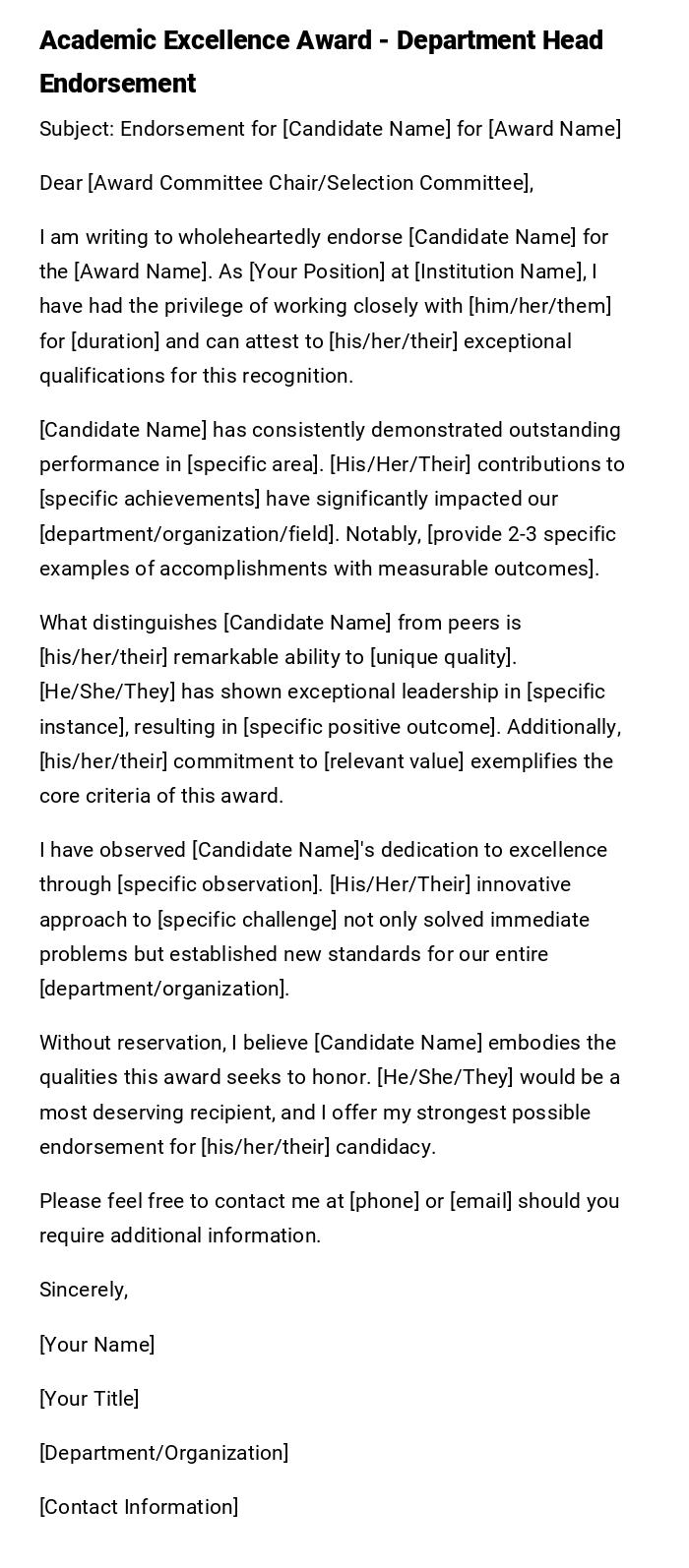
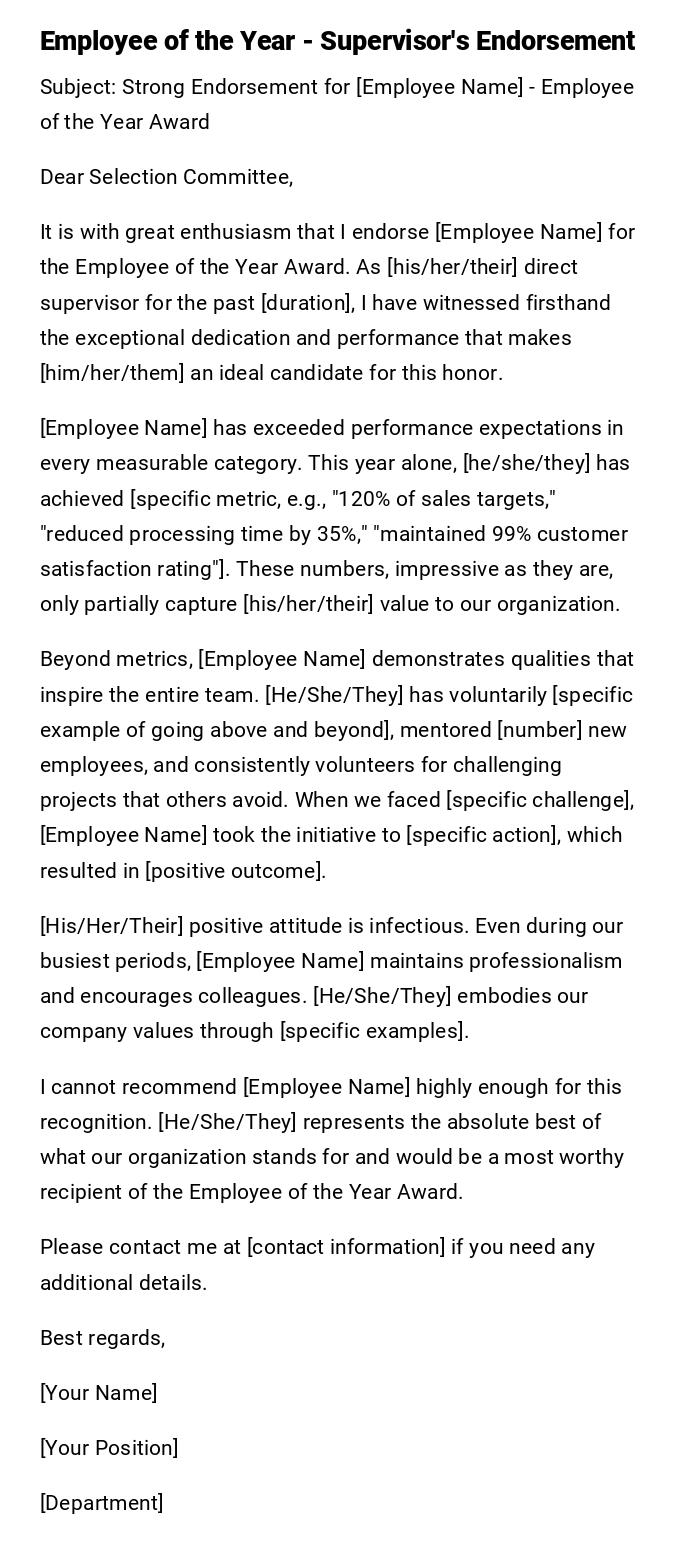
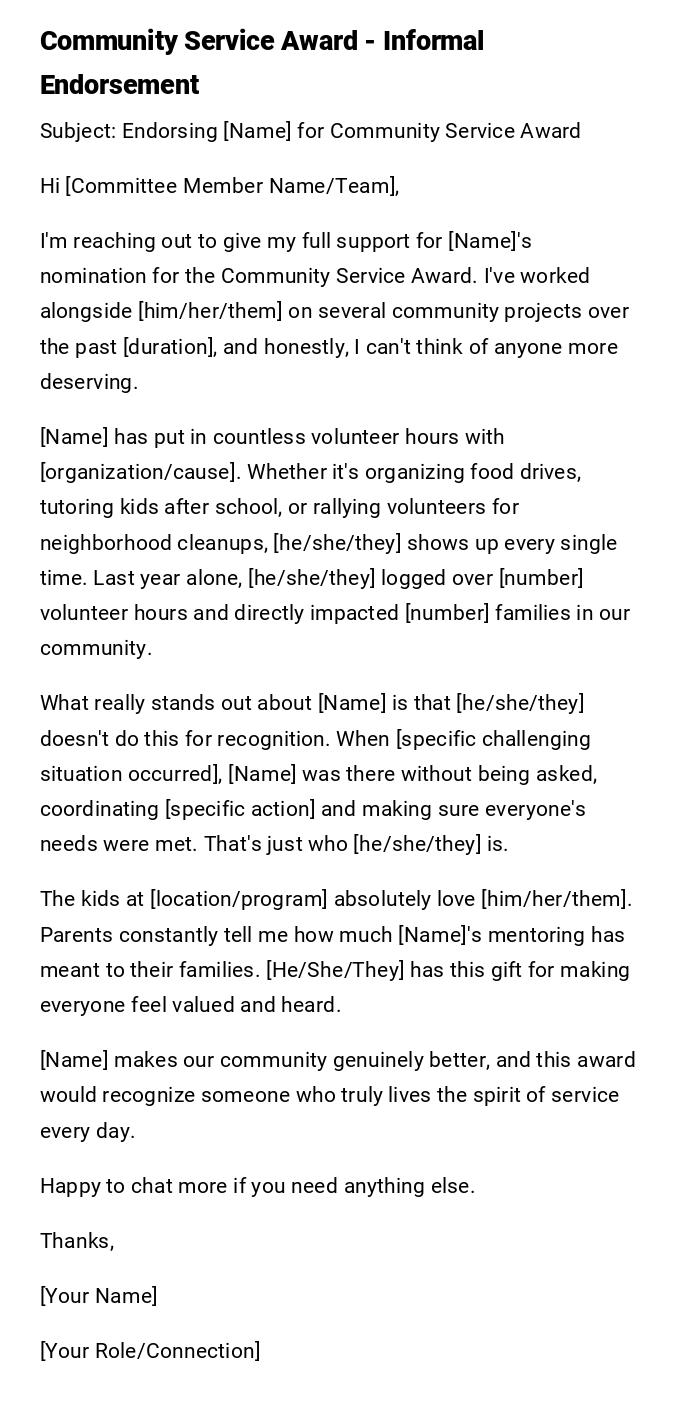
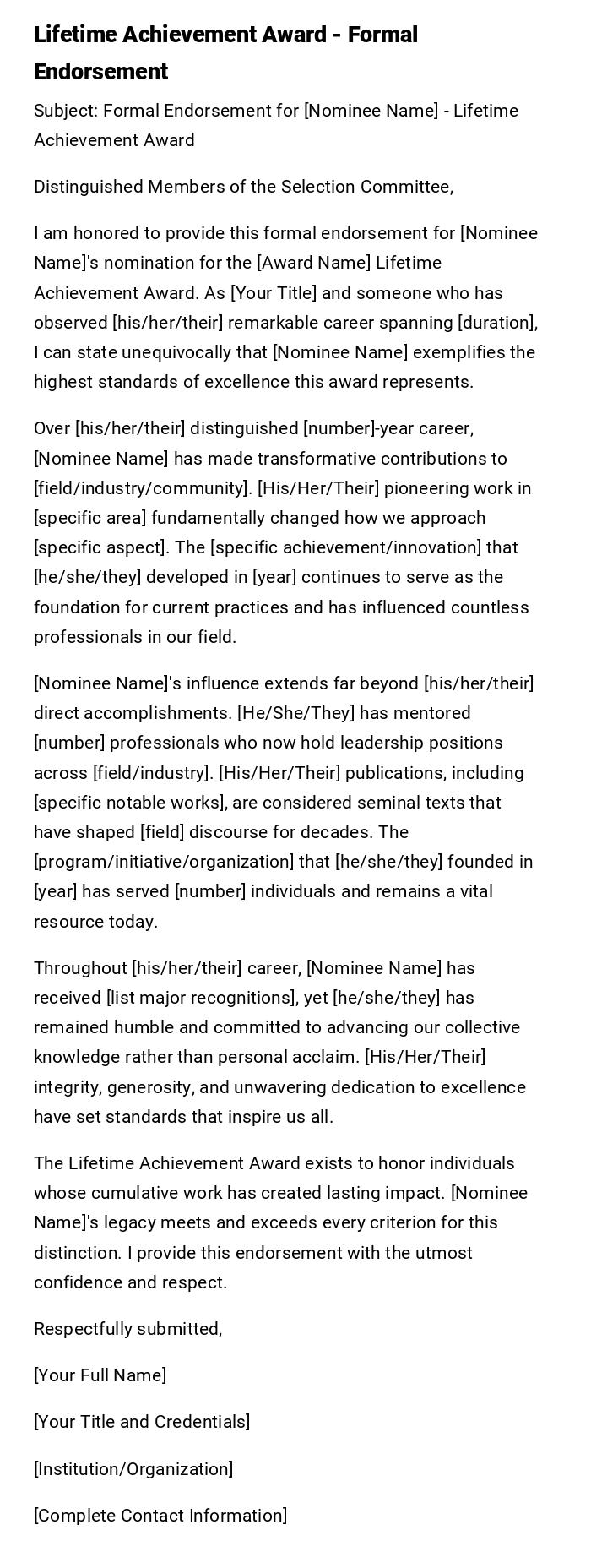
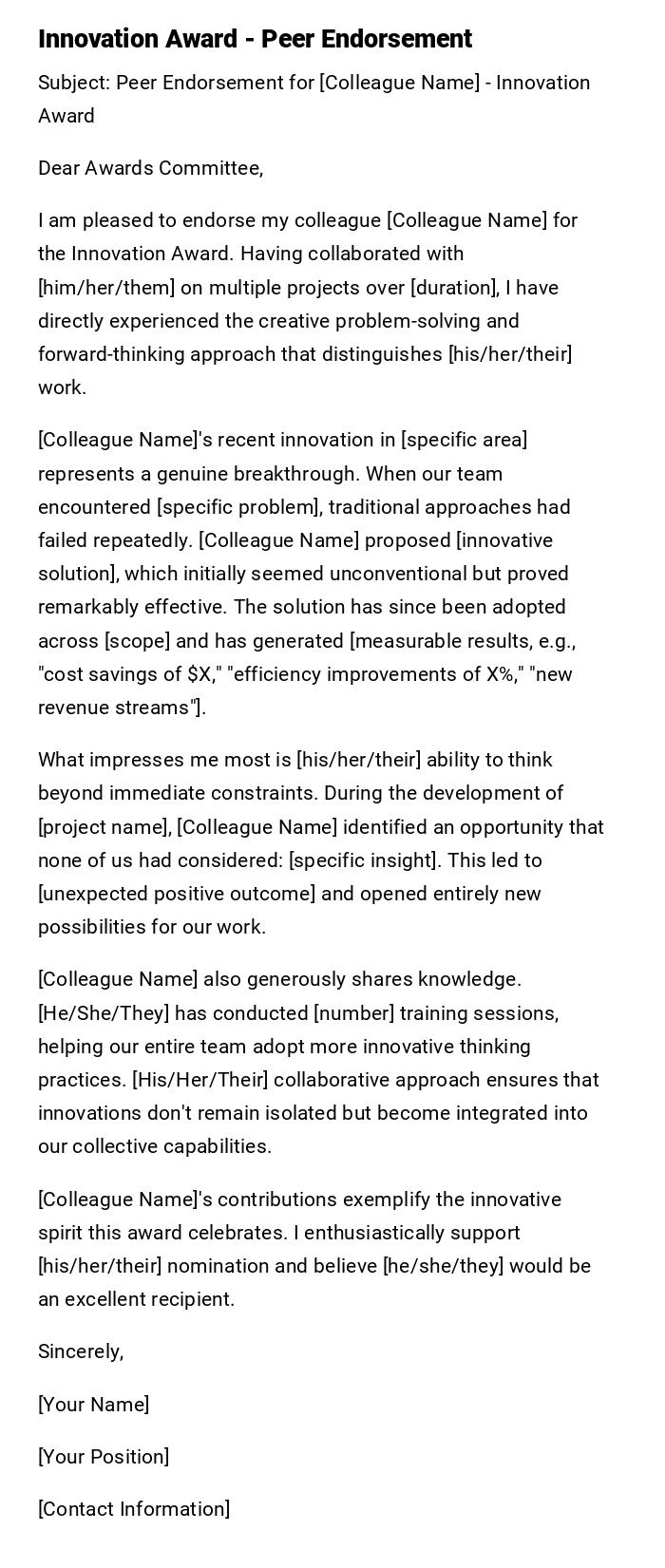
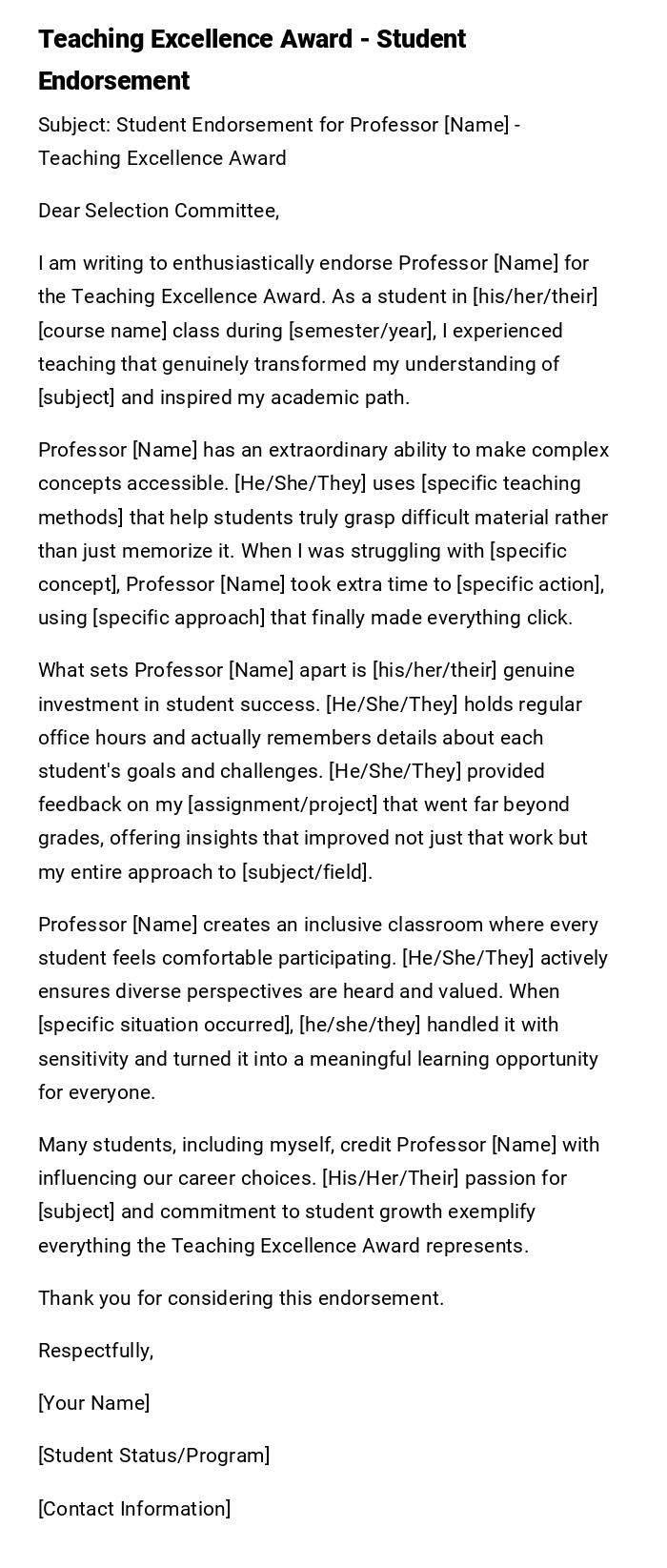
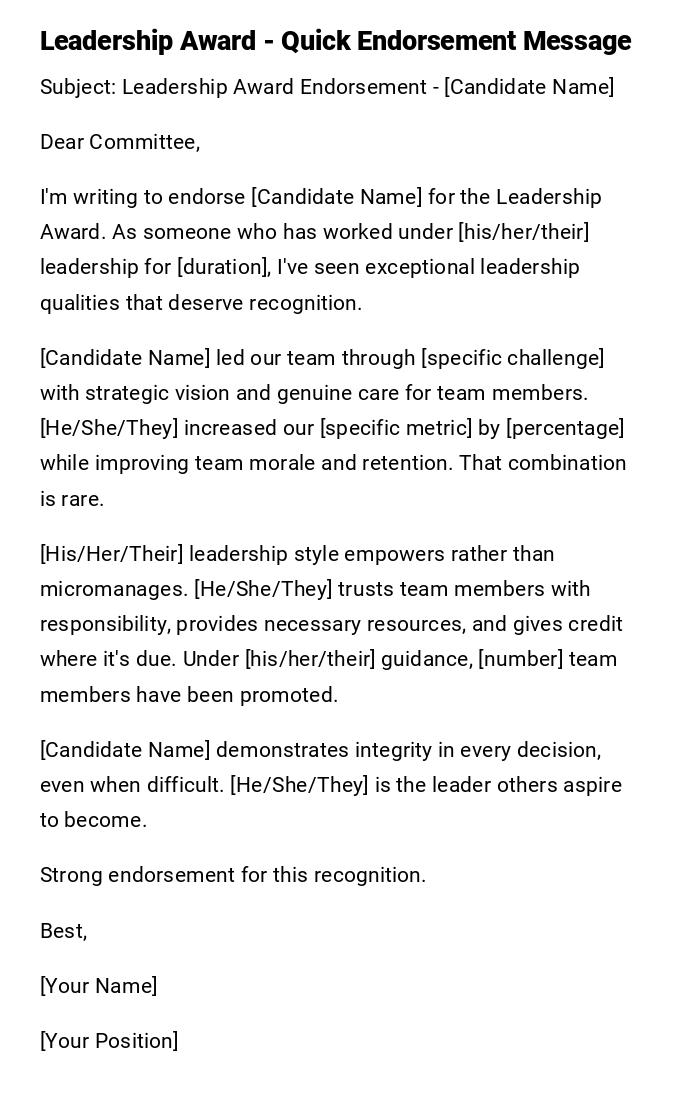

 Download Word Doc
Download Word Doc
 Download PDF
Download PDF